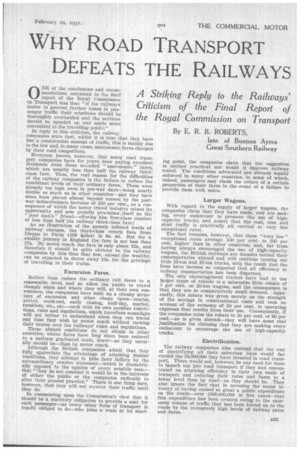WHY ROAD TRANSPORT DEFEATS THE RAILWAYS
Page 103

If you've noticed an error in this article please click here to report it so we can fix it.
0 NE of the conclusions and recommendations contained in the final report of the Royal Commission on Transport was that "If the railways desire to prevent further losses in passenger traffic their schedules should be thoroughly overhauled and the services should be speeded up and made more convenient to the travelling public."
In reply to this criticism, the railway companies state that, whilst it is true that they have lost a considerable amount of traffic, this is mainly due to the low and, in many cases, uneconomic fares charged by their road competitors.
Everyone knows, however, that many road transport companies have for years been paying excellent dividends from these so-called "uneconomic" fares, which are usually less than half the railway thirdclass fare. Thus, the real reason for the difficulties of the railway companies is the failure to reduce the exorbitant levels of their ordinary fares. These were already too high even in pre-war days—being nearly double as much as in other countries—and they have since been placed almost beyond reason by the postwar indiscriminate increase of 100 per cent., as a consequence of which the motor travel industry seized its opportunity and now proudly proclaims ,itself as the "poor man's" friend—offering him first-class comfort at less than half the railway third-class fare!
As an illustration of the grossly inflated levels of railway charges, the third-class return fare from Dieppe to Paris (108 miles) is 8s. 4d. But for a similar journey in England the fare is not less than 27's. By motor coach the fare is only about 12s., and therefore it should be quite obvious to the railway companies by this time that few, except the wealthy, can be expected to throw away 15s. for the privilege of travelling in their trains.
Excursion Fares.
Rather than reduce the ordinary rail fares to a reasonable level, and so allow the public to travel cheaply when and where they will, at their own convenience, the companies have built up a cranky structure of excursion and other cheap fares—tourist, period, week-end, early closing, half-day, market, ramblers, etc., etc.—each with its own peculiar restrictions, rules and regulations,. which travellers nowadays will not bother to understand when they can travel any time they wish by motor coach without racking their brains over the railways' rules and regulations.
These absurd conditions do not obtain in other countries, where fares have long since been reduced to a uniform graduated scale, lower—as they naturally should be—than by motor coach.
Although the British companies admit that they fully appreciate the advantage of attaining similar conditions, they attempt to hide their failure by the extraordinary evaSive statement—which is diametrically . opposed to the opinion of every sensible man— that "they do not consider it would be in the interests of either the public or the companies radically to alter their present practice." There is one thing sure, however, that they will not recover their traffic until they do.
In commenting upon the Commission's view that it should be a statutory obligation to provide a seat for each passenger—as every other form of transport is legally obliged to do—who joins a train at its start
lug point, the companies claim that the suggestion is neither practical nor would it improve railway travel. The conditions advocated are already legally enforced in many other countries, in some of which, indeed, passengers may claim the return of a certain proportion of their fares in the event of a failure to Provide them with seats.
Larger Wagons.
With regard to the supply of larger wagons, the companies claim that they have made, and are making, every endeavour to promote the use of highcapacity trucks, and assert that the coal, iron and steel traffic is practically all carried at very low exceptional rates.
The fact remains, however, that these "very low " exceptional rates average 150 per cent, to 200 per cent, higher than in other countries,, and, far from having always •encouraged the use of high-capacity wagons, the British railways are decades behind their contemporaries abroad and still continue turning out little 10-ton and 12-ton trucks, with the result that the lines have become so congested that, all efficiency in railway transportation has been dispersed.
The only encouragement traders have had to use larger types of vehicle is a miserable little rebate of 5 per cent. on 20-ton wagons, and the consequence is that they are in comparatively small demand. Apparently, this rebate was given merely on the strength of the savings in constructional costs and took no account of the economy of 50• per cent. in operating expenses that results from their use. Consequently, if the companies raise the rebate to 20 per cent. or 30 per cent.—as is given abroad—they will have some real justification for claiming that they are making every endeavour to encourage the use of high-capacity trucks.
Electrification.
The railway companies also contend that the cost of electrifying all their suburban lines would far exceed the £9,000,000 they have invested in road transport. There would not, however, be any need for them to launch out into road transport if they had concentrated on attaining efficiency in their own mode of transport and reducing their rates and fares to a lower level than by road—as they should be. They also ignore the fact that in accusing the motor industry of having caused so great a public' expenditure on the roads—over £500,000,000 in five years—that this expenditure has been created owing to the enormous volume of traffic that has been forced on to the roads by the excessively high levels of railway rates and fares.




























































































































































































